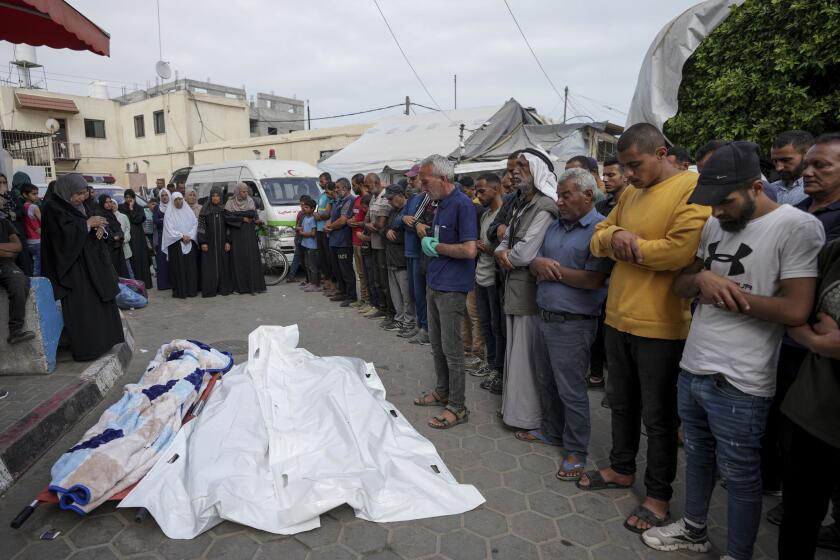Column: Don’t denigrate pro-Palestinian campus protests by claiming the Vietnam War protests backfired

When did it become fashionable to diminish the accomplishments of Vietnam War-era protesters by accusing them of inflated self-regard and delusions about what their activism accomplished?
In my view, the situation in the Mideast is more nuanced and complex than the United States’ involvement in Vietnam ever was. Israel’s horrific response notwithstanding, I fear that many pro-Palestinian student activists are naively unwilling to confront the role that Hamas and its allies have played in the conflict.
But telling students that their agitation is pointless or merely performative because some folks have doubts about the effectiveness of the anti-Vietnam War movement is just wrong.
“Those students didn’t shorten that terrible war,” wrote New York Times columnist Nick Kristof about the protesters of the late 1960s. “Instead, they probably prolonged it.”
“The nostalgic champions of the campus protests of the ’60s would have Americans believe they were a heroic success, stopping the Vietnam War,” wrote Jonah Goldberg in the Los Angeles Times. “But what they actually helped achieve was Richard Nixon’s election and seven more years of war.”
There is certainly some truth there.
A cascade of decisions that Folt made this spring around USC’s commencement and Israel-Hamas war-related protests inflamed tensions and opened wounds, presenting the most significant test of her tenure.
Americans chose Republican Richard Nixon over Democrat Hubert Humphrey in 1968, at a time when urban uprisings and all kinds of political turbulence had exhausted voters. The Democratic Party was in disarray after President Lyndon B. Johnson declined to run again, Robert Kennedy was assassinated and the peace candidate, Eugene McCarthy, failed in his quest for the Democratic presidential nomination at the party convention. Nixon, after all, famously courted that “silent majority” of presumably politically moderate Americans. But Nixon also promised to end the Vietnam War, which a solid majority of the American public had soured on after the Tet Offensive in early 1968.
But blaming antiwar protesters for Nixon’s decision to protract the war in his misguided search for “peace with honor” and with his clandestine bombing of Cambodia is unfair.
And using that conclusion to critique today’s student protesters, who have upended college campuses with their pro-Palestinian protests and encampments, trivializes the precious American right to protest peacefully.
Law enforcement fired ‘less-lethal’ rounds as the UCLA encampment was cleared, and protesters say they ‘connected with heads and hands.’
After Nixon was elected, the antiwar movement gained a legitimacy that led to real change.
In response to a spate of civil disobedience, including organized draft card burnings, Nixon acknowledged that the deeply unpopular draft had to end. By 1972, a year before the Paris Peace Accords ended America’s role in the war, more U.S. men had filed for conscientious objector status than were actually drafted. By some estimates, 100,000 young men are believed to have left the country rather than fight in a morally indefensible conflict that had exacted a terrible cost in American and Vietnamese blood and treasure.
Veterans like John Kerry, a Navy Swift boat commander horrified by what he’d seen and experienced in Vietnam, came home and campaigned against the war. How could anyone deny the effect Vietnam Veterans Against the War had on public sentiment?
In early 1971 in Detroit, the group convened the Winter Soldier investigations, a three-day event where Vietnam veterans testified about atrocities that they had both witnessed and inflicted. And later that year, Kerry became the first Vietnam vet to testify on Capitol Hill.
Less than 24 hours after a violent attack on a pro-Palestinian camp at UCLA, officers pulled apart barricades as they tore down the encampment and made arrests.
“Each day,” he told the Senate Foreign Relations Committee in the spring of 1971, “someone has to give up his life so that the United States doesn’t have to admit something that the entire world already knows, so that we can’t say that we have made a mistake. How do you ask a man to be the last man to die for a mistake?”
Here are some other ways antiwar protesters of that era helped change this country for the better:
Since the founding, the voting age in this country was 21. The idea that you could kill or die for your country but not have a voice in its politics finally became untenable during the Vietnam War. Barry Maguire’s 1965 hit song, “Eve of Destruction” — “You’re old enough to kill, but not for votin’” — helped crystallize the issue, and the 26th Amendment was ratified on July 1, 1971.
Hamas says it’s sending a delegation to Egypt as soon as possible to continue talks in the latest sign of progress in the fragile cease-fire process.
Americans’ blind faith in their government was forever shaken by the release of the Pentagon Papers, purloined and made public by Daniel Ellsberg, the onetime military analyst turned antiwar activist, and the New York Times and the Washington Post. The leaked portion of the Defense Department report revealed to the public that the government had systematically lied about the war for years to the public and to Congress.
As someone whose family was active in the antiwar movement, and who was present as a child when Los Angeles police officers attacked antiwar protesters outside the Century Plaza Hotel in 1967, I recognize my own bias here.
Will the current protest movement have an effect on American foreign policy and President Biden’s support for Israel’s devastating and disproportionate retaliation for the Oct. 7 attacks by Hamas?
Perhaps, like the Vietnam War protests of the last century, there will be short-term backlash followed by long-term positive change.
Claiming the protests are misguided, or doing more harm than good, is presumptuous in the extreme.
More to Read
A cure for the common opinion
Get thought-provoking perspectives with our weekly newsletter.
You may occasionally receive promotional content from the Los Angeles Times.
















